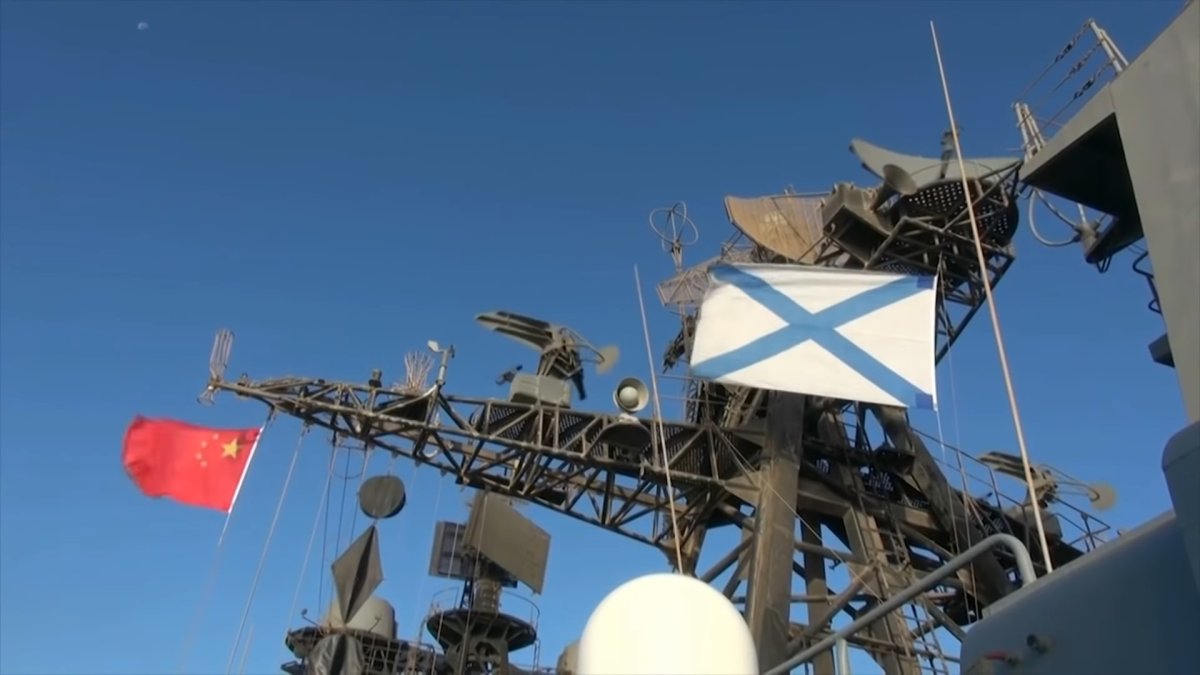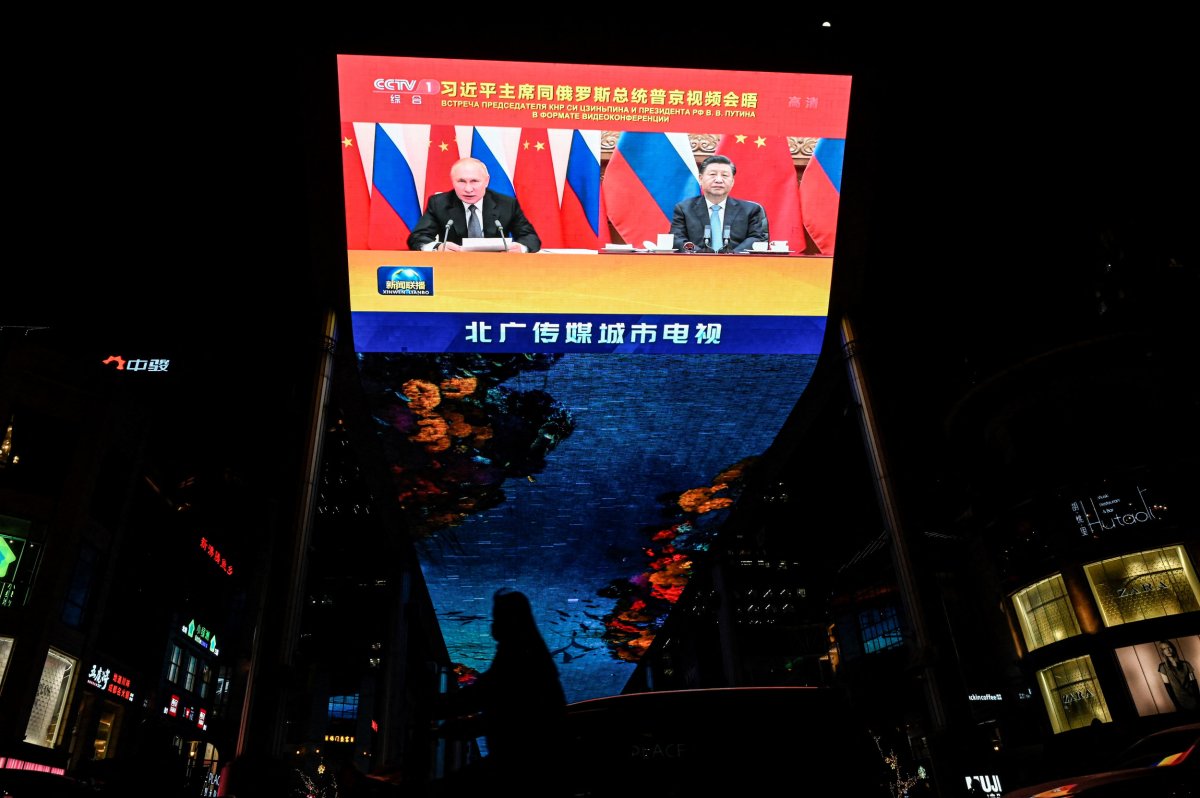Russia has conducted another round of joint naval exercises with China at a time when tensions over the Ukraine crisis have pushed Moscow to openly consider accelerating its decision to ditch the U.S. dollar in favor of its national currency when dealing with top trade partner Beijing.
Russian and Chinese warships joined forces for the "Peaceful Sea-2022" anti-piracy drills in the Arabian Sea. The maneuvers involved the Russian Pacific Fleet's Slava-class missile cruiser Varyag, Udaloy-class large anti-submarine destroyer Admiral Tributs and the large sea tanker Boris Butoma as well as Chinese People's Liberation Army Navy's Type 052D guided-missile destroyer Ürümqi and Type 903A supply ship Taihu.
The Russian Defense Ministry said Tuesday that the two navies worked together on tactical maneuvering, inspections and the freeing of a ship that was simulated to have been seized by maritime militants.
The Chinese Defense Ministry echoed this itinerary of the training and lauded the exercise as a demonstration of the growing ties between the two powers and their armed forces.
"The exercise further enriched the connotation of the comprehensive strategic partnership of coordination between China and Russia in the new era, accumulated useful experience for the two sides to jointly carry out anti-piracy missions, and improved the capabilities and level of the two militaries to jointly deal with maritime threats and maintain the safety of maritime strategic channels," the Chinese side said Tuesday.
It was the third joint naval maneuver involving the two nations in a week. On January 18 and 20, Chinese and Russian vessels joined their Iranian counterparts for exercises in the Gulf of Oman. It also follows a series of joint maritime training in the Pacific and land exercises conducted by China and Russia last year and in prior years as well.
The strategic partnership between Moscow and Beijing has proven to be one of the important geopolitical developments of the 21st century. And while Russian officials such as ambassador to China Andrey Denisov have repeatedly ruled out the notion of a formal military alliance, the envoy said that their trade coalition could prove a buffer economic threats by the United States.
During an interview with the state-run Tass Russian News Agency on Tuesday, Denisov said the two nations "are switching to national currencies" when it comes to bilateral transactions. And though the pair was not planning to "completely switch," he suggested that the introduction of sweeping sanctions by Washington may "somewhat speed up" the process.
"There are so-called financial information transmission systems," Denisov said. "The one developed in Russia may well meet our demands at least in payment and settlement relations with Chinese financial and banking organizations."
He said this was "a fairly complex issue with numerous elements that requires substantial negotiation work," but the two powers were prepared to work through it.
"The most important thing is that any developments in various sanctions cases will not impede the development of our commercial and economic relations," Denisov said, adding that he did not believe reports suggesting the U.S. was considering cutting Russia off from the Society for Worldwide Interbank Financial Telecommunication (SWIFT) system.

U.S. officials have repeatedly threatened to slap Russia and even President Vladimir Putin himself with intensive, unprecedented sanctions should the Kremlin decide to pursue military action on Ukraine. Moscow officials have denied plans for an invasion of the neighboring ex-Soviet republic but have amassed tens of thousands of troops near the border and have demanded Kyiv be excluded from joining the NATO Western military alliance.
The U.S. warning was reiterated Tuesday, alongside threats of additional U.S. troops deployments in nearby NATO member states, by President Joe Biden himself during a press gaggle outside local Washington, D.C. shop Honey Made.
"I have made it clear, early on to President Putin that if he were to move into Ukraine, that there'd be severe consequences, including significant economic sanctions, as well as I'd feel obliged to beef up our presence, NATO's presence on the eastern front: Poland, Romania, et cetera," the U.S. president said.
Asked if this could include blacklisting the Russian leader himself, Biden responded with an affirmation: "Yes, I would see that."
Though the White House has ruled out sending U.S. troops to Ukraine, the threat of sanctions against Putin, his administration and other Russian institutions has been met with defiance from Moscow. Russian Foreign Minister Sergey Lavrov and Kremlin spokesperson Dmitry Peskov have gone as far to warn that such a move could lead to a total fallout in relations between the U.S. and Russia.
As these relations deteriorate, China has watched carefully on the sidelines. Denisov said Thursday that "our Chinese partners demonstrate a full and adequate understanding of Russia's position."
Beijing's own relationship with Washington has soured significantly in recent years with the U.S. having announced a diplomatic boycott of the upcoming Winter Olympic Games set to begin next week in Beijing over allegations of human rights abuses and simmering tensions between the two top powers in the Asia-Pacific region.
But the tensions in Ukraine have also loomed over plans to hold the global sporting event. Chinese permanent representative to the United Nations Zhang Jun said Tuesday that Russian colleagues had informed him there was no plan to invade Ukraine throughout the duration of the roughly two-week Olympics.
"It's my strong wish that all countries, parties to existing conflicts will abide by the Olympic truce resolution," Zhang told reporters, according to Tass. "Concerning the situation in Ukraine, we have heard from Russia that it is not their intention to launch any war. What we should do at this moment is to call on all parties to come to the negotiation table and to find the solution through dialogue."
Putin is set to travel to China to hold his first in-person summit with Chinese President Xi Jinping since the beginning of the COVID-19 pandemic nearly two years ago.
Following their last virtual meeting in December, Russian presidential aide Yuri Ushakov told Russian media that "particular attention was paid to the need to intensify efforts to form an independent financial infrastructure to service trade operations between Russia and China" during the talks between the two leaders. The goal, he said at the time, was "to create such a structure that could not be influenced by third countries."

Notably, war between Russia and Georgia, another neighboring rival with aspirations of joining NATO, erupted on the eve of the last Olympics held in Beijing in 2008. In an interview last month with Newsweek, however, Russian ambassador to the U.S. Anatoly Antonov dismissed any comparisons between the two situations.
He said "it is very important to keep in mind" that the 2008 conflict was precipitated by "an armed aggression by [then–Georgian President Mikheil] Saakashvili's regime."
"This person nursed by the U.S. and its allies used the moment while the attention of the whole world was attracted to the summer Olympics in Beijing to fulfill his crime against people of Abkhazia and South Ossetia," Antonov said at the time. "The unprovoked attack claimed more than 1,000 lives, including Russian peacekeepers. We called on the United States to stop the madman in Tbilisi and had to react with our military might only 24 hours after the blatant and heinous offence against peace in the Caucasus had been committed."
And though the Russian envoy in Washington rejected any direct coordination with China on the current situation in Eastern Europe, he said Moscow and Beijing would continue to work together on international affairs.
"Any analogy of Russia and China coordination with regard to Ukraine is nonsense," Antonov said at the time. "Although speaking more broadly, there is no doubt that the current situation in the world fosters further strengthening of the strategic partnership between Moscow and Beijing. But unlike the U.S. and its NATO allies we have no geopolitical plans and aims against any sovereign country.
"Russia's foreign policy is aimed at creating a stable and sustainable system of international relations based on international law and principles of equality, mutual respect and non-interference in internal affairs of states," he added.
Uncommon Knowledge
Newsweek is committed to challenging conventional wisdom and finding connections in the search for common ground.
Newsweek is committed to challenging conventional wisdom and finding connections in the search for common ground.
About the writer
Based in his hometown of Staten Island, New York City, Tom O'Connor is an award-winning Senior Writer of Foreign Policy ... Read more
To read how Newsweek uses AI as a newsroom tool, Click here.








